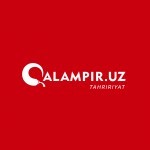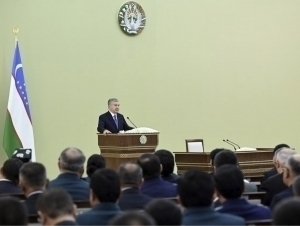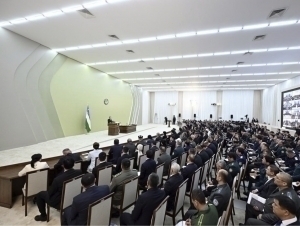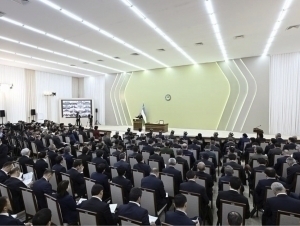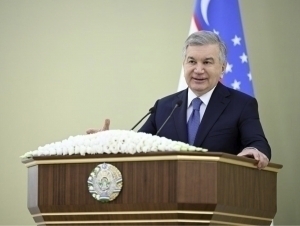Weekly digest: Leapmotor ban, Mirziyoyev's table, tax for artists, US block
Review
−
06 April 2025 11938 18 minutes
Import of Leapmotor Cars Banned
The news that stirred Uzbeks in the past week was again related to cars. The import of Chinese Leapmotor cars into Uzbekistan has been banned. This announcement sparked great discussions and protests on social networks, which were followed by a response from the Technical Regulation Agency.
It is noted that a C16 car belonging to the Chinese company Leapmotor was recently tested in a laboratory.
"The results showed that this car does not meet international standards, particularly the safety requirements established by the United Nations, with a result 16 times higher than the established norm."
It is reported that Leapmotor failed to meet the requirements for priority and immunity to external electromagnetic radiation (broadband electromagnetic interference).
After this ban, entrepreneurs involved in the sale of electric cars sent an appeal to the President via social networks. Entrepreneurs, who said they were supporters of the free market, asked the head of state to lift the restrictions and support an open market.
Following the objections, it was reported that the Business Ombudsman's Office is studying the compliance of the entrepreneurs' appeal with the requirements of the legislation, and ways to resolve this issue positively have been discussed with representatives of the Agency for Technical Regulation.
However, the agency retracted its statement and issued a new one indicating that Chinese Leapmotor cars will be re-tested in Uzbekistan with the participation of specialists from this company. Negotiations regarding the restrictions imposed on Leapmotor are still ongoing.
As is known, in 2024, Uzbekistan imported 24,095 electric cars from abroad worth 224.8 million US dollars. Of these, 23,982 were from China, with Leapmotor being the leader among the buyers.
By the resolution of the Cabinet of Ministers on January 31 of this year, titled "On Additional Measures to Finance the Organization of Infrastructure for the Disposal of Batteries of Vehicles with Electric Motors," from May 1, 2025, the disposal fee for imported electric vehicles will increase from 45 million sums to 78.5 million sums, depending on the year of manufacture of the vehicle.
Earlier, the BYD Uzbekistan Factory company appealed to the government of Uzbekistan to restrict the illegal import of electric vehicles, citing their incompatibility with local climatic and road conditions and the lack of official guarantees. BYD Uzbekistan Factory LLC, which operates in Jizzakh, was established on January 23, 2023. Uzavtosanoat JSC, which does not share its monopoly status, holds a 60% stake in BYD Uzbekistan Factory LLC.
In the first half of 2024 alone, UzAuto Motors received customs benefits worth 317 billion soums, and BYD Uzbekistan Factory received 274 billion soums.
Now the rich will pay a separate tax because they are rich
In Uzbekistan, the wealthy will now pay a separate tax due to their income. This was announced not by just a few individuals but by the First Deputy Chairman of the Tax Committee, Mubin Mirzayev, at a press conference held at the AOKA last week.
He noted that 18 million citizens of Uzbekistan, out of a population of almost 38 million, have income and must pay taxes.
“By segmenting them, we have developed special measures for the payment and collection of taxes from individuals with the highest incomes. A complete database of them will be created, which will ensure that no individual can reduce or change their income to evade taxes,” said Mubin Mirzayev.
The planned system involves taxing not only income earned in Uzbekistan but also income earned abroad. According to unofficial data, about 4 million of Uzbekistan's population work abroad. International experts suggest the real number may be much higher. Uzbekistan also intends to tax citizens working abroad.
"If a resident of Uzbekistan receives income abroad, they will have to pay taxes in the country. In the case of non-residents, the Tax Committee will take into account tax payments made abroad to prevent double taxation," Mirzayev explained.
Do you remember? Before the 2021 presidential elections, Alisher Kadyrov, a candidate from the "Milliy Tiklanish" democratic party, proposed taxing Uzbeks working abroad. At that time, his proposal was widely condemned and ridiculed, and it was one of the reasons for his electoral defeat.
Kadyrov's controversial statement had a significant impact on the political environment of the time, prompting the current president, Shavkat Mirziyoyev, to speak out against the idea and promise that such a tax would not be introduced. On the contrary, he promised to support the return of citizens from abroad and to reduce taxes.
At the press conference, the chairman of the Tax Committee, Mubin Mirzayev, made a long-awaited announcement that will likely provoke frustration among artists, singers, and performers who are perceived as living in luxury without paying taxes. From 2027 onwards, income tax will be collected from artists on a mandatory basis. Until now, the lack of taxation for artists, who earn millions of dollars without declaring their income, was seen by many as a double standard and an unfair privilege granted to the select few.
According to Mubin Mirzayev, under the current procedure, artists must submit a declaration, disclose their income, and pay taxes accordingly. However, this system has not been effective.
“We must admit that many of our artists do not comply with this. They do not fully declare their income, and taxes are not collected from it. We are preparing a draft resolution as part of our efforts to combat the underground economy,” said Mubin Mirzayev.
In 2025 and 2026, artists will be given the opportunity to submit income declarations without facing penalties. Starting January 1, 2027, if artists do not fully declare their income or evade taxes, they will be subject to tax inspections, and taxes will be calculated and collected.
"From January 1, 2027, no artist or individual will be allowed to evade tax declarations," Mirzayev stated.
I have another piece of advice for Mirzayev: social media is key! Almost all artists are busy showing off how many weddings they attend per day, which expensive world brands they wear, what jewelry they buy, and their luxury cars, mansions, villas, and cottages. They are unafraid to flaunt their wealth. If they don't declare their income, a system of estimated declarations should be implemented. Moreover, not only artists, but also bloggers and those engaged in advertising activities on social media, earning income, should be taxed.
But there is another side to the issue.
According to the Law of the Republic of Uzbekistan "On Licensing Certain Types of Activities," concert and entertainment activities are subject to licensing. This includes singers, instrumentalists, musicians, and performers of songs and music, as well as those providing services at weddings and concerts. They are required to obtain a license from “Uzbekkoncert.” If their behavior changes and they become unruly, “Uzbekkoncert” has the authority to revoke their licenses. If the Tax Committee implements the new procedure, will artists lose their licenses and become unaccountable to “Uzbekkoncert”? If this organization, considered the unofficial guardian of artists, loses its right to issue licenses, how will it continue to enforce its influence?
First "Central Asia-European Union" summit held
Samarkand hosted a historic event—the first Central Asia-European Union summit. During the summit, very important agreements were reached, notably elevating relations between Central Asia and the European Union to a strategic level.
The summit was attended by the Presidents of the Central Asian states: Kassym-Jomart Tokayev, Sadir Japarov, Emomali Rahmon, Serdar Berdimuhamedov, and Shavkat Mirziyoyev, along with President of the European Council Antonio Costa and President of the European Commission Ursula von der Leyen.
Key proposals were discussed during the summit. In particular, President of Uzbekistan Shavkat Mirziyoyev expressed his support for negotiations on a peaceful resolution of the situation in Ukraine and stated that the international community fails to adequately address the threats emanating from Afghanistan.
In his speech, Antonio Costa expressed the EU's desire to support peace efforts in Ukraine and contribute to global stability alongside Central Asian countries.
Ursula von der Leyen announced the beginning of a "new era of strategic partnership" between Europe and Central Asia, including Uzbekistan. She outlined four priority areas for EU cooperation with Central Asian countries: transport corridors, critical raw materials, "green" energy, and global digital infrastructure.
At the summit’s conclusion, a joint declaration was adopted. The document confirmed the leaders of Kazakhstan, the Kyrgyz Republic, Tajikistan, Turkmenistan, Uzbekistan, and the European Union's commitment to elevate their relationship to a strategic partnership and deepen cooperation in the face of shifting global and regional geopolitical dynamics.
The leaders also expressed their dedication to working together for peace, security, and democracy. They reaffirmed their commitment to respecting the independence, sovereignty, and territorial integrity of all states within their internationally recognized borders, and to upholding the UN Charter and principles of international law. They underscored the importance of achieving a just, lasting, and comprehensive peace in Ukraine as soon as possible, in accordance with the UN Charter. Additionally, they emphasized the need for participating states to adhere to the principles of the OSCE.
“We reaffirmed that all states should refrain from the use or threat of force in their relations with each other, abide by international humanitarian law, and resolve conflicts by peaceful means,” the document stated.
In this context, the summit participants committed to respecting the aforementioned principles—especially the sovereignty and territorial integrity of all states—across all international and regional forums, refraining from actions that contradict these principles.
The participants also reiterated their commitment to supporting Afghanistan's transformation into a secure, stable, and prosperous state with inclusive governance systems that uphold the human rights and freedoms of all citizens, including women, girls, ethnic and religious minorities. It was emphasized that Afghanistan should strive to be a peacemaker both domestically and in its relations with neighboring countries, fulfilling its international obligations.
Cooperation to prevent sanctions circumvention remains a crucial element of the relationship. The European Union has demanded that Central Asian countries remain transparent in their dealings and avoid assisting Russia in evading sanctions on imports and exports. The signed document agreed to continue collaboration with the EU Special Representative for Sanctions to prevent the re-export of high-priority products.
At the same time, the European Union and Central Asian leaders reaffirmed that the rule of law, promotion and protection of human rights, and fundamental freedoms are core values of their bilateral relations. The promotion of freedom of expression and association, creating an enabling environment for civil society and independent media, and safeguarding the rights of human rights defenders, women, children, and laborers were also highlighted. However, it remains uncertain whether the Central Asian countries, which received low scores in the Democracy Index, will be able to meet the agreement's demands. The European Union has committed to supporting efforts to address these issues both regionally and nationally.
Following the summit, the leaders participated in the Samarkand International Climate Forum.
After the summit and forum, European Council President António Costa and European Commission President Ursula von der Leyen held a press conference. Leyen was asked why Central Asia should trust Europe over China and Russia.
“Russia has long shown that it cannot be a reliable partner. The European Union has already proven itself as a reliable and stable partner. Our projects aim to benefit both parties. Unlike China and Russia, the European Union is a different kind of partner, particularly regarding important raw materials,” Leyen said.
She continued, “In the past, China and Russia often extracted raw materials, transported them to their countries, and processed them there, leaving no added value in the country of extraction.”
At the summit’s conclusion, President Shavkat Mirziyoyev introduced his eldest daughter, Saida Mirziyoyev, to Ursula von der Leyen.
“I am pleased to have personally met President António Costa of the European Council and President Ursula von der Leyen of the European Commission during the forum. Ms. Ursula von der Leyen’s leadership and consistency in advancing the climate agenda are inspiring and strengthen confidence in effective international cooperation,” Saida Mirziyoyev wrote on her social media page.
3 Uzbeks convicted of murdering a Rabbi sentenced to death
Do you recall the incident that led to complications for Uzbeks entering the UAE, particularly in Dubai, causing them to be stranded at airports? At the end of November last year, the body of Rabbi Zvi Kogan, a citizen of Israel and Moldova, a member of the Chabad-Lubavitch movement and a Jewish evangelist, was discovered in the United Arab Emirates. Three Uzbeks were charged with his murder and were promptly arrested.
Last week, the Abu Dhabi Federal Court of Appeals, specifically the State Security Chamber, sentenced the three Uzbeks—28-year-old Olim Tohirovich, Mahmud Abdulrahim, and 33-year-old Azizbek Komilovich—to death.
The Israeli press was among the first to report the verdict, and although the Ministry of Foreign Affairs of Uzbekistan had spread the news via diplomatic missions in the UAE and on the Uzbek press, it did not respond publicly. However, when the Ministry was accused of involvement in the murder, the Consulate General of Uzbekistan in Dubai and the Embassy of Uzbekistan in Abu Dhabi confirmed that they were in regular contact with the UAE Ministry of Foreign Affairs and relevant departments, working to clarify the matter and promising additional information. Despite this, no updates came for more than four months, until the court verdict was finally announced, but further details remained unclear. The Ministry of Foreign Affairs confirmed to QALAMPIR.UZ that the Uzbeks had been sentenced to death.
The Attorney General, Dr. Hamad Saif Al Shamsi, after investigations conducted by the State Security Prosecution Office, concluded that the defendants stalked and murdered the victim. He ordered the immediate arraignment of the four defendants in January 2025. The evidence presented to the court included detailed confessions from the defendants, forensic medical reports, post-mortem reports, descriptions of the tools used in the crime, and witness testimonies.
The court also sentenced the individual who assisted the killers to life imprisonment. This individual will be deported after serving the sentence, though his identity and nationality have not been disclosed.
Under UAE law, death sentences are automatically appealed and forwarded to the Criminal Division of the Federal Supreme Court for review, meaning that the death sentence may not be executed immediately and could be altered.
Explosion in a mosque in Andijan
On March 31, an explosion occurred at the "Ahmadali Khoji" mosque in the Izboskan district of Andijan. Initial official reports stated that three people were killed and ten injured, but these details were not updated. No fire resulted from the explosion, but the ablution building collapsed. Deputy Prime Minister Ochilboy Ramatov, Minister of Emergency Situations Major General Botir Kudratkhodjaev, and regional governor Shukhratbek Abdurakhmonov arrived at the site.
A government commission was established under Ramatov's leadership, and the Andijan regional prosecutor's office opened a criminal case under Articles 205 (Abuse of power or official authority) and 259 (Violation of fire safety regulations) of the Criminal Code. The preliminary investigation is underway.
According to the regional prosecutor’s office, the explosion occurred when natural gas leaked from pipes connected to heating devices in the basement of the ablution building. The accumulated gas ignited when electricity was turned on, causing the building to collapse. The investigation is ongoing to clarify all circumstances and determine legal actions.
Social media users have raised doubts about the official reports, questioning the accuracy of the information regarding the number of victims and injuries. Similar skepticism was voiced regarding official reports following a gas station explosion in Fergana on December 17 of last year, when four fatalities were reported.
While the explosion in Fergana was reportedly much more severe than in Andijan, no government officials, including the governor, minister, or deputy prime minister, visited the region or formed a government commission. No official condolences were issued either. However, the chairman of the Muslim Board of Uzbekistan, Mufti Sheikh Nuriddin Khaliqnazar, did visit the mosque where the explosion occurred, inspecting the damage, meeting with victims' families, and offering condolences. He also provided financial assistance, although the exact amount was not disclosed, with the Muslim Board noting that the assistance was in accordance with current legislation.
Colonel Agzam Fakhriddinovich Izbosarov dies
Colonel Agzam Fakhriddinovich Izbosarov, the former head of the Main Directorate of the State Security Service of Uzbekistan, has passed away, according to a statement from the SBU. It is notable that such news is rare within the SBU's series of announcements.
Izbosarov had a distinguished career, including serving as the head of the Communications Department of the General Staff of the Armed Forces. He later worked as the first deputy chairman of the board of JSC "Territorial Electric Networks," focusing on the utilization of electrical networks.
Agzam Izbosarov held advanced degrees, including a Candidate of Technical Sciences (PhD) and a Doctor of Technical Sciences (DSc). In recognition of his contributions, he was awarded the honorary title of Honored Communications Worker of the Republic of Uzbekistan in 2005 and the Order of "Mardlik" in 2021.
Uzbekistan ranks 146th in the democracy index
Uzbekistan has dropped 0.2 points in the 2024 Democracy Index, compiled by the Economist Intelligence Unit, an analytical department of "The Economist" magazine. Despite this, the country moved up two places in the overall ranking, reaching 146th due to the deterioration of democracy in other nations.
Among the five Central Asian countries, two—Turkmenistan and Tajikistan—continue to exhibit very low levels of democracy. In Turkmenistan, the index remains unchanged since 2020, at 1.66, ranking it last in the region. Tajikistan's index fell from 1.94 in 2023 to 1.83 in 2024, attributed to a decline in political participation under President Emomali Rahmon's total control of the political system.
Kyrgyzstan remains the leader in democracy within Central Asia, though it too saw a decline in its performance, dropping from 3.72 to 3.52 in the 2024 index. This decline is largely due to deteriorations in the electoral process and heightened pressure on the media.
Kazakhstan maintains its position with an index of 3.08, placing 118th globally.
Among the Central Asian countries and the Eurasian Economic Union (EAEU), Armenia achieved the highest democracy index with 5.35 points, ranking 82nd in the world. This allows Armenia to remain classified under the "hybrid regime" category.
The study highlights that the global trend shows a crisis of democracy, not just in individual countries but across regions. According to the Economist Intelligence Unit, democracy is increasingly evaluated based on surveys linked to the Hopelessness Index. This data reveals the factors contributing to public dissatisfaction with the state of democracy, showing that the mere existence of formal democratic institutions is insufficient to secure social support, particularly when decisions are made by unelected bodies.
For context, Norway leads the global democracy rankings with an index of 9.81, standing as the most democratic country in the world.
Social media accounts of US visa applicants under scrutiny
While discussions of democracy often revolve around ideals, it is important to recognize that the pursuit of a perfect democratic system is an elusive goal. Even those nations that champion democracy worldwide, create democracy indices, and impose sanctions based on democratic evaluations often grapple with contradictions. These countries frequently face accusations of double standards, especially when it comes to human rights and democracy, and some individuals inevitably fall victim to these discrepancies.
This brings us to a recent development that highlights the complexity of such issues. Last week, U.S. Secretary of State Marco Rubio ordered a directive to scrutinize the social media accounts of certain individuals applying for U.S. visas, particularly those with F, M, and J visas (student and exchange visitor visas). The new measures require diplomats abroad to carefully examine the social media activity of visa applicants and potentially deny entry to individuals who have criticized the United States or Israel.
This directive specifically targets individuals suspected of sympathizing with terrorist organizations, those who held student or exchange visas between October 7, 2023, and August 31, 2024, or those whose visas were revoked after October 2024. The dates referenced seem to focus on individuals who expressed support for the Palestinian cause during the recent conflict.
In line with Rubio’s instructions, applicants could also face visa denials if their actions or behavior reflect hostility toward U.S. citizens, U.S. culture, or American governmental institutions and principles.
In related news, U.S. Ambassador to Uzbekistan, Jonathan Henick, made a call for Uzbeks living illegally in the United States to return home. In a video shared on the embassy's social media, Henick highlighted that many Uzbeks have entered the U.S. through dangerous routes via Central America. He urged these individuals to voluntarily return to Uzbekistan, warning that failure to do so could result in arrest or deportation.
Live
All